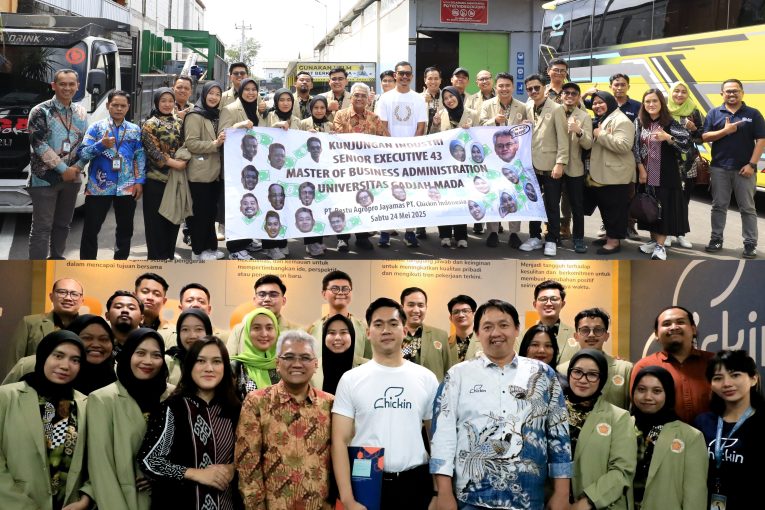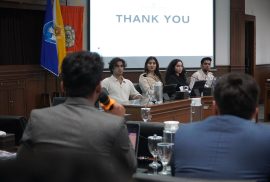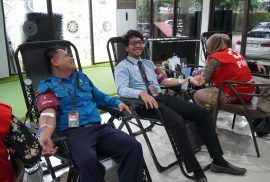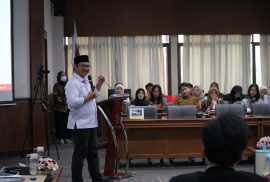
The Operations and Technology Management course taught by Prof. Ir. Adi Djoko Guritno, MSIE, Ph., conducted an industrial visit to two leading agribusiness companies in Central Java, namely PT Restu Agropro Jayamas (PT RAJA) and PT Sinergi Ketahanan Pangan (Chickin Indonesia). This industrial visit was conducted alongside students from the Senior Executive MBA (SEMBA) 43 Yogyakarta program at the Faculty of Economics and Business, Gadjah Mada University (FEB UGM) on Saturday, May 24, 2025.
The first visit was to PT RAJA in Klaten, a company that focuses on the production of high-quality hybrid corn seeds. Established on January 31, 2019, as a subsidiary of CV Restu Sejati, PT RAJA has a long history in agricultural partnerships, including as a supplier of tobacco and cloves to multinational companies since 1951. PT RAJA’s Director of Operations, Mr. Hartanto, welcomed the UGM FEB MBA students and explained the company’s vision to support national food security through seed innovation. “We believe that the future of corn farmers begins with the best seeds,” he said.
The company has developed more than 1,000 hybrid corn varieties per year and has a new factory in Kediri that doubles its production capacity. Their flagship products, such as R7 Gold, R7 Red, and R7 Ultimate, are designed to provide maximum yields with disease resistance and adaptability to various types of land. Currently, PT RAJA has reached a production capacity of up to 5,000 hectares and a seed output of 10,000 tons per year.
FEB UGM MBA students gained an in-depth understanding of the strategies and transformations carried out by the company in the last five years. Operationally, PT RAJA faced major challenges in the 2019–2022 period, particularly in terms of limited land processing capacity. More than half of the plants still use external rental facilities, and in 2023, 69% of production is still carried out through tolling mechanisms. However, acceleration efforts have succeeded in reducing dependence on external facilities to only 22% in 2024, with a target of total tolling elimination by 2025.
This transformation is supported by the construction and renovation of the Kediri plant facility, which is now capable of increasing capacity from 19 tons to 500 tons per week. Industry 4.0 technologies such as PLC (Programmable Logic Controller) and DCS (Distributed Control System) are used selectively, while still prioritizing the role of humans in controlling safety and quality, especially in the drying process which has high risks.
PT RAJA also has a strict physical and biotech laboratory system to ensure seed quality, including testing moisture content (<11%), minimum germination rate of 85%, and genetic purity tests. The traceability process is strengthened through government blue labels equipped with QR codes for online access to information.
PT RAJA’s business model is based on partnerships with farmers. The company provides seeds, assists with the planting and harvesting phases (110 days), and conducts quality control at the farmer level. The R&D approach is also carried out comprehensively from generation 0 to commercial seeds, including the selection and purification process in the field.
In its marketing and forecasting strategy, PT RAJA divides its market into four segments: conventional, private label (B2B), plantation collaboration, and government projects as a buffer. The company does not over-supply and instead manages demand with a conservative and sustainable approach. After a discussion session and field observation at PT RAJA, participants continued their trip to Solo to visit the second company, Chickin Indonesia.
The presentation session by CEO & Founder Mr. Ashab Al Kahfi Ananda Putra explained that protein consumption in Indonesia is still very low, only around 3 kg per capita per year. One of the reasons for this is the length of the distribution chain. “The price of chicken from farmers is only around IDR 10,000/kg, but by the time it reaches consumers, it can reach IDR 30,000/kg. This is the disparity we aim to resolve,” he stated.
Chickin Indonesia, established in 2020, is an agritech company providing integrated solutions for broiler chicken farmers. Through the Chickin Smart Farm platform, the company offers Internet of Things (IoT) and artificial intelligence (AI) technology to help farmers manage their coops efficiently, including temperature control, humidity, air circulation, and real-time monitoring of livestock conditions.
Chickin has also developed ci-Touch and Chickin Apps, cloud-based and offline platforms that support 24-hour monitoring of coop performance. This system can reduce chicken mortality rates by up to 50% and increase cost efficiency by up to 15%. Chickin does not provide direct funding, but distributes seeds and feed through an integrated financing system based on farmer credit scoring.
The lecturer in charge of the course, Mr. Adi Djoko, also shared his views on the importance of this activity in the learning process. “Theory and practice are two sides of the same coin that cannot be separated. Through this industry visit, I hope that students can learn directly from the field, see the dynamics of the industry in real life, and take advantage of this opportunity to deepen their understanding,” he said.
One of the participants, Laurentius Damar P., also shared his impressions of this activity. “This industry visit shifted the paradigm of Operations Management, which used to be theoretical and formulaic, into real action to carry out lean and streamlined operations from start to finish. Both companies, PT Agropro Restu Jayamas and PT Chickin Indonesia, provided concrete illustrations of downstreaming in the agroindustry, from livestock and agriculture to end products,” he said.
This industrial visit not only broadened students’ understanding of operational processes and technological innovations in the agribusiness sector but also provided real-world inspiration on the importance of efficiency, innovation, and sustainability in building national food security.
Reporter: Aldanu Hutasoit
Editor: Ayu Aprilia




